【配套K12】[学习]浙江省绍兴县杨汛桥镇八年级英语上册 Unit 6 I’m going to s
- 格式:doc
- 大小:121.50 KB
- 文档页数:8
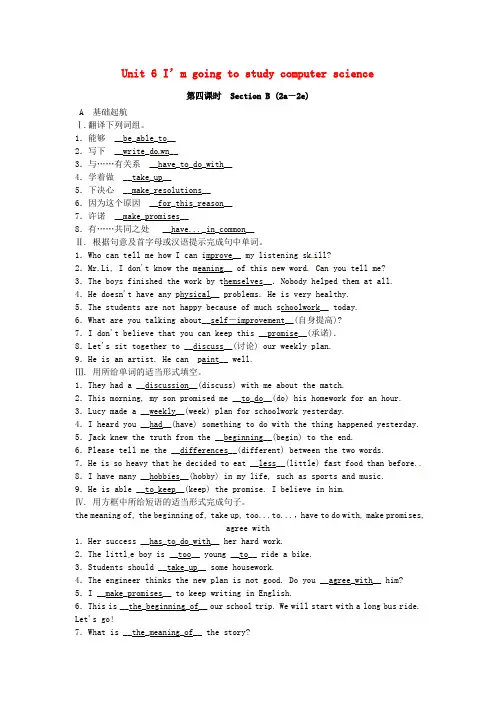
Unit 6 I’m going to study computer science第四课时Section B (2a-2e)A 基础起航Ⅰ.翻译下列词组。
1.能够__be_able_to__2.写下 __write_do wn__3.与……有关系 __have_to_do_with__4.学着做 __take_up__5.下决心 __make_resolutions__6.因为这个原因 __for_this_reason__7.许诺 __make_promises__8.有……共同之处 __have..._in_common__Ⅱ. 根据句意及首字母或汉语提示完成句中单词。
1.Who can tell me how I can improve__ my listening sk ill?2.Mr.Li, I don't know the meaning__ of this new word. Can you tell me?3.The boys finished the work by themselves__.Nobody helped them at all.4.He doesn't have any physical__ problems. He is very healthy.5.The students are not happy because of much schoolwork__ today.6.What are you talking about__self-improvement__(自身提高)?7.I don't believe that you can keep this __promise__(承诺).8.Let's sit together to __discuss__(讨论) our weekly plan.9.He is an artist. He can paint__ well.Ⅲ. 用所给单词的适当形式填空。
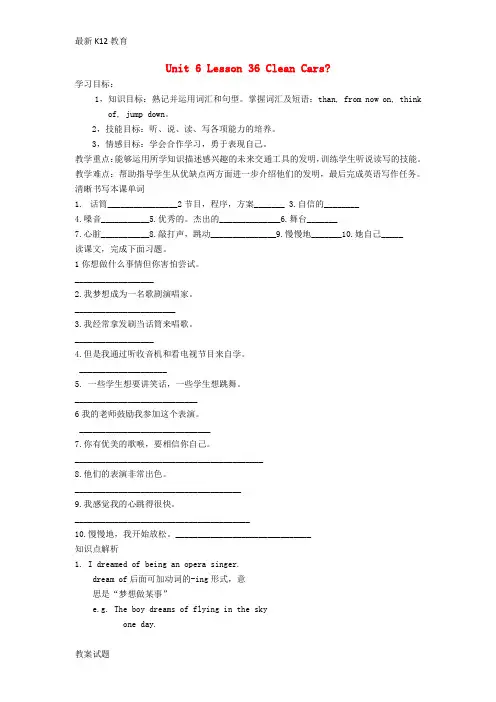
Unit 6 Lesson 36 Clean Cars?学习目标:1,知识目标:熟记并运用词汇和句型。
掌握词汇及短语:than, from now on, think of, jump down。
2,技能目标:听、说、读、写各项能力的培养。
3,情感目标:学会合作学习,勇于表现自己。
教学重点:能够运用所学知识描述感兴趣的未来交通工具的发明,训练学生听说读写的技能。
教学难点:帮助指导学生从优缺点两方面进一步介绍他们的发明,最后完成英语写作任务。
清晰书写本课单词1.话筒________________2节目,程序,方案_______ 3.自信的________4.嗓音___________5.优秀的。
杰出的______________6.舞台_______7.心脏___________8.敲打声,跳动_______________9.慢慢地_______10.她自己_____读课文,完成下面习题。
1你想做什么事情但你害怕尝试。
__________________2.我梦想成为一名歌剧演唱家。
_______________________3.我经常拿发刷当话筒来唱歌。
__________________4.但是我通过听收音机和看电视节目来自学。
____________________5. 一些学生想要讲笑话,一些学生想跳舞。
____________________________6我的老师鼓励我参加这个表演。
______________________________7.你有优美的歌喉,要相信你自己。
___________________________________________8.他们的表演非常出色。
______________________________________9.我感觉我的心跳得很快。
________________________________________10.慢慢地,我开始放松。
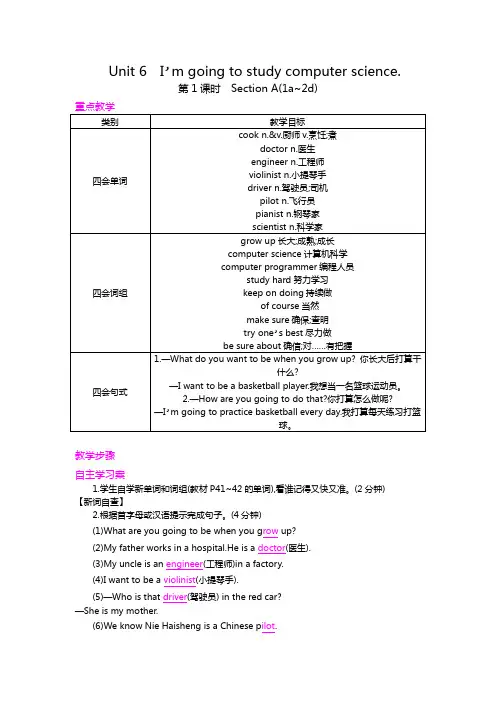
Unit 6 I’m going to study computer science.第1课时Section A(1a~2d)教学步骤自主学习案1.学生自学新单词和词组(教材P41~42的单词),看谁记得又快又准。
(2分钟)【新词自查】2.根据首字母或汉语提示完成句子。
(4分钟)(1)What are you going to be when you g row up?(2)My father works in a hospital.He is a doctor(医生).(3)My uncle is an engineer(工程师)in a factory.(4)I want to be a violinist(小提琴手).(5)—Who is that driver(驾驶员) in the red car?—She is my mother.(6)We know Nie Haisheng is a Chinese p ilot.(7)—Do you like playing the piano?—Yes,I want to be a pianist(钢琴家).(8)—Are you a teacher?—No,I am a student in that c ollege.课堂导学案Step 1 情景导入参考案例T:Hello, everyone!We know every child has his own great idea.I think you do the same.When you grow up, maybe you want to be a teacher,a businessman,a pilot,or an engineer.Today we are going to talk about the topic about your future intentions.Turn to look at Unit 6.I’m going to study computer science.What do you want to be when you grow up?S:I want to be a …when I grow up.T:How are you going to do that?S:I’m going to …环节说明:通过谈论学生未来的职业理想导入课题,激发学生学习本单元的兴趣。
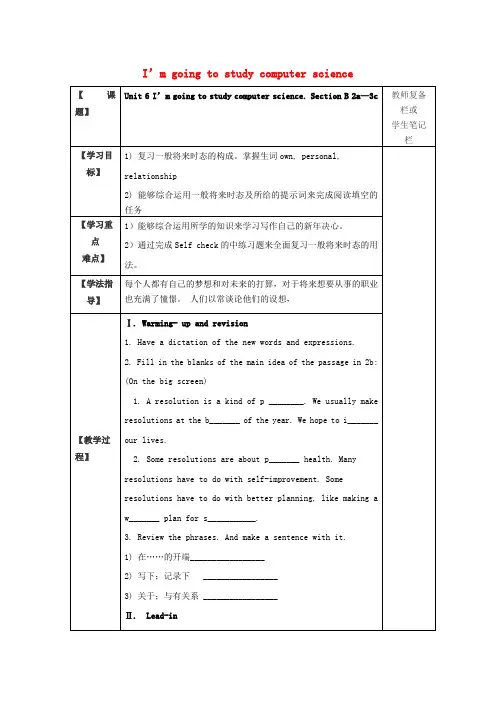
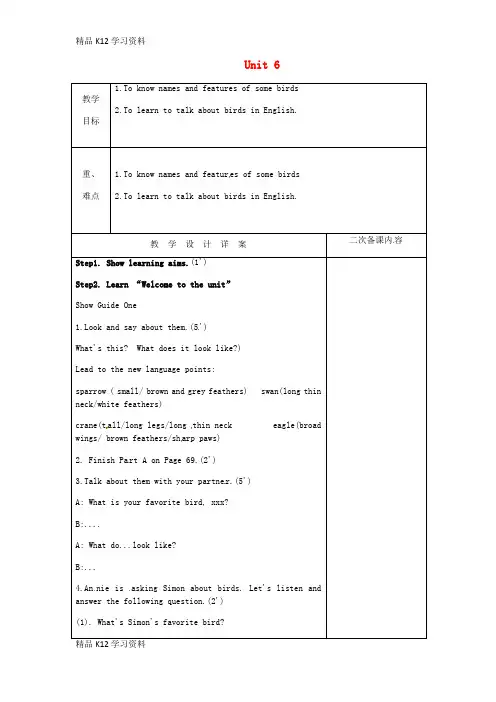
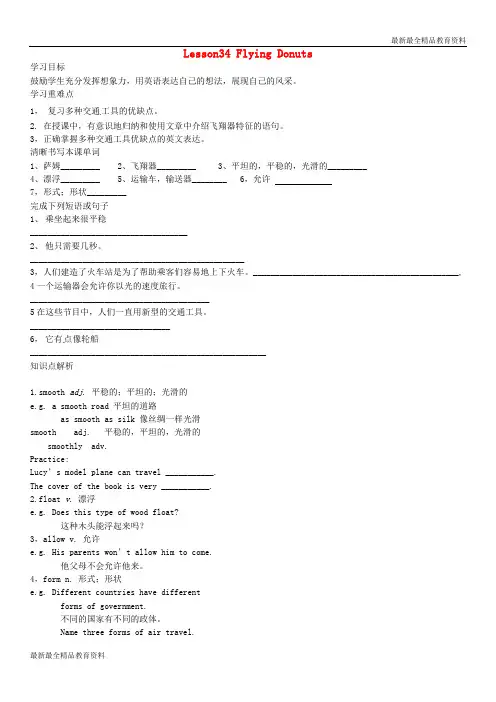
Lesson34 Flying Donuts学习目标鼓励学生充分发挥想象力,用英语表达自己的想法,展现自己的风采。
学习重难点1,复习多种交通工具的优缺点。
2. 在授课中,有意识地归纳和使用文章中介绍飞翔器特征的语句。
3,正确掌握多种交通工具优缺点的英文表达。
清晰书写本课单词1、萨姆_________2、飞翔器_________3、平坦的,平稳的,光滑的_________4、漂浮_________5、运输车,输送器________ 6,允许7,形式;形状_________完成下列短语或句子1、乘坐起来很平稳____________________________________2、他只需要几秒。
_________________________________________________3,人们建造了火车站是为了帮助乘客们容易地上下火车。
_______________________________________________, 4一个运输器会允许你以光的速度旅行。
_________________________________________5在这些节目中,人们一直用新型的交通工具。
________________________________6,它有点像轮船______________________________________________________知识点解析1.smooth adj. 平稳的;平坦的;光滑的e.g. a smooth road 平坦的道路as smooth as silk 像丝绸一样光滑smooth adj. 平稳的,平坦的,光滑的smoothly adv.Practice:Lucy’s model plane can travel ___________.The cover of the book is very ___________.2.float v. 漂浮e.g. Does this type of wood float?这种木头能浮起来吗?3,allow v. 允许e.g. His parents won’t allow hi m to come.他父母不会允许他来。
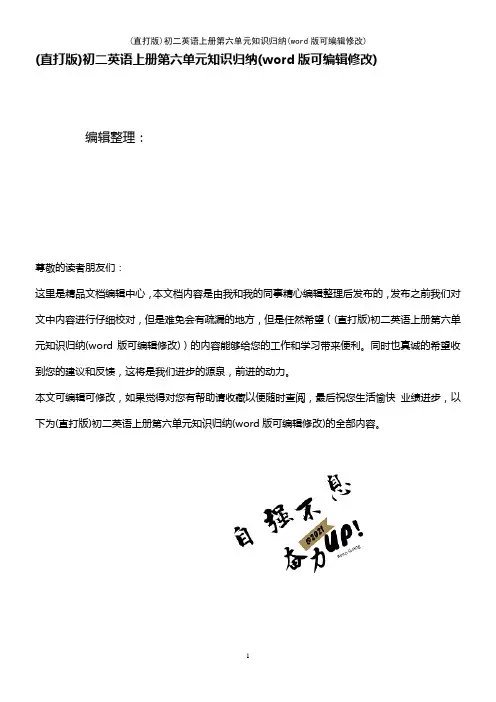
(直打版)初二英语上册第六单元知识归纳(word版可编辑修改)编辑整理:尊敬的读者朋友们:这里是精品文档编辑中心,本文档内容是由我和我的同事精心编辑整理后发布的,发布之前我们对文中内容进行仔细校对,但是难免会有疏漏的地方,但是任然希望((直打版)初二英语上册第六单元知识归纳(word版可编辑修改))的内容能够给您的工作和学习带来便利。
同时也真诚的希望收到您的建议和反馈,这将是我们进步的源泉,前进的动力。
本文可编辑可修改,如果觉得对您有帮助请收藏以便随时查阅,最后祝您生活愉快业绩进步,以下为(直打版)初二英语上册第六单元知识归纳(word版可编辑修改)的全部内容。
初二英语上册第六单元知识归纳Unit 6 I'm going to study computer science。
知识点归纳:1。
I want to be a computer programmer.我想要成为一名电脑程序设计师【解析】 program n 节目→ programmer—My favorite TV _______ is A Bite of Chinese (舌尖上的中国).—We like it, too。
My mother often cooks delicious food after watching it。
A。
instruction B。
guidebook C. entertainment D。
programProgrammer n.程序员;程序器;节目编排者 =programer(英)。
The programmer come up with a solution to the system problem. 程序员想出了一个解决系统问题的办法.computer programmer电脑程序编制员.。
.(计算机管理员)My father is a computer ___________________(program) in a big company.2. bus driver 公共汽车司机 basketball player篮球运动员【解析】drive v 驾驶→ driver n 司机Mr. Green ____________(driver) his car to the office yesterday。
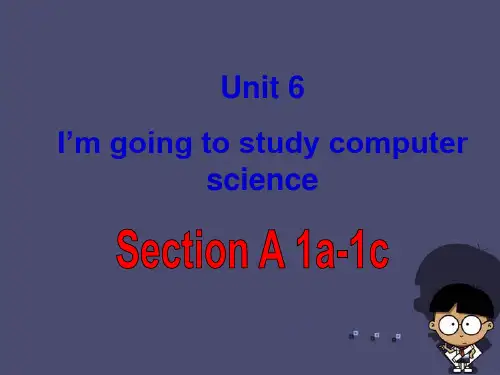

八年级英语上册第6单元知识点(word版可编辑修改)八年级英语上册第6单元知识点(word版可编辑修改)编辑整理:尊敬的读者朋友们:这里是精品文档编辑中心,本文档内容是由我和我的同事精心编辑整理后发布的,发布之前我们对文中内容进行仔细校对,但是难免会有疏漏的地方,但是任然希望(八年级英语上册第6单元知识点(word版可编辑修改))的内容能够给您的工作和学习带来便利。
同时也真诚的希望收到您的建议和反馈,这将是我们进步的源泉,前进的动力。
本文可编辑可修改,如果觉得对您有帮助请收藏以便随时查阅,最后祝您生活愉快业绩进步,以下为八年级英语上册第6单元知识点(word版可编辑修改)的全部内容。
Unit6 I’m going to study computer science.一、词的转换1。
violin小提琴 (表人)violinist 小提琴家2。
piano钢琴(表人)pianist 钢琴家3。
science科学(表人)scientist科学家4.drive开车(表人)driver 司机5。
education教育(形容词)educational 有教育意义的6.send发送过去式sent7.foreign外国 (表人)foreigner外国人8.mean意味着(名词)meaning意思9.discuss讨论(名词)discussion讨论10。
begin开始 (名词)beginning开始11。
hobby爱好(复数)hobbies12。
week一周(形容词)weekly每周的13。
one person一个人(不可以说one people) (形容词)personal 个人的14.different 不同的(名词)differences不同、差异二、短语归纳1.grow up成长;长大2. improve in 在。
.。
.有所提高3。
be sure about对……有把握4。
make sure确信;务必+to do sth5.send…to…把……送到……6.be able to do sth 能够做某事 =can+动词原形7.the meaning of……的意思8。
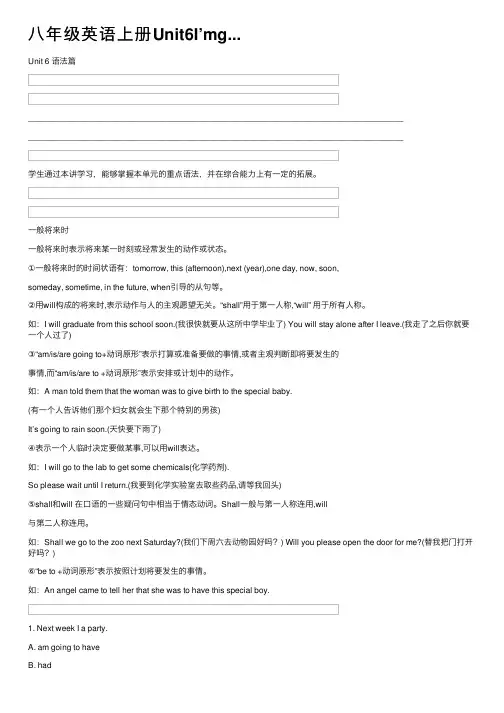
⼋年级英语上册Unit6I’mg...Unit 6 语法篇____________________________________________________________________________________________________________________________________________________________________学⽣通过本讲学习,能够掌握本单元的重点语法,并在综合能⼒上有⼀定的拓展。
⼀般将来时⼀般将来时表⽰将来某⼀时刻或经常发⽣的动作或状态。
①⼀般将来时的时间状语有:tomorrow, this (afternoon),next (year),one day, now, soon,someday, sometime, in the future, when引导的从句等。
②⽤will构成的将来时,表⽰动作与⼈的主观愿望⽆关。
“shall”⽤于第⼀⼈称,“will” ⽤于所有⼈称。
如:I will graduate from this school soon.(我很快就要从这所中学毕业了) You will stay alone after I leave.(我⾛了之后你就要⼀个⼈过了)③“am/is/are going to+动词原形”表⽰打算或准备要做的事情,或者主观判断即将要发⽣的事情,⽽“am/is/are to +动词原形”表⽰安排或计划中的动作。
如:A man told them that the woman was to give birth to the special baby.(有⼀个⼈告诉他们那个妇⼥就会⽣下那个特别的男孩)It’s going to rain soon.(天快要下⾬了)④表⽰⼀个⼈临时决定要做某事,可以⽤will表达。
如:I will go to the lab to get some chemicals(化学药剂).So please wait until I return.(我要到化学实验室去取些药品,请等我回头)⑤shall和will 在⼝语的⼀些疑问句中相当于情态动词。
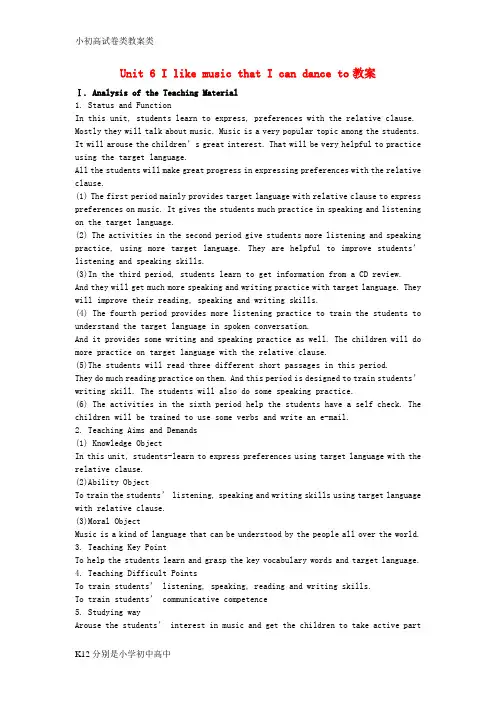
Unit 6 I like music that I can dance to教案Ⅰ. Analysis of the Teaching Material1. Status and FunctionIn this unit, students learn to express, preferences with the relative clause. Mostly they will talk about music. Music is a very popular topic among the students. It will arouse the children’s great interest. That will be very helpful to practice using the target language.All the students will make great progress in expressing preferences with the relative clause.(1) The first period mainly provides target language with relative clause to express preferences on music. It gives the students much practice in speaking and listening on the target language.(2) The activities in the second period give students more listening and speaking practice, using more target language. They are helpful to improve students’listening and speaking skills.(3)In the third period, students learn to get information from a CD review. And they will get much more speaking and writing practice with target language. They will improve their reading, speaking and writing skills.(4) The fourth period provides more listening practice to train the students to understand the target language in spoken conversation.And it provides some writing and speaking practice as well. The children will do more practice on target language with the relative clause.(5)The students will read three different short passages in this period.They do much reading practice on them. And this period is designed to train students’writing skill. The students will also do some speaking practice.(6) The activities in the sixth period help the students have a self check. The children will be trained to use some verbs and write an e-mail.2. Teaching Aims and Demands(1) Knowledge ObjectIn this unit, students-learn to express preferences using target language with the relative clause.(2)Ability ObjectTo train the students’listening, speaking and writing skills using target language with relative clause.(3)Moral ObjectMusic is a kind of language that can be understood by the people all over the world.3. Teaching Key PointTo help the students learn and grasp the key vocabulary words and target language.4. Teaching Difficult PointsTo train students’ listening, speaking, reading and writing skills.To train students’ communicative competence5. Studying wayArouse the students’ interest in music and get the children to take active partin expressions on music.Ⅱ. Language FunctionExpress preferencesⅢ. Target LanguageWhat kind of music do you like?I like music that I can sing along with. What about you?prefer music that has great lyrics.Ⅳ.structureRelative clauses with that and who.Ⅴ. VocabularyLyric, gentle, remind of, exhibition, prefer, photographer, energyⅥ. Recyclingsinger, music, dance, quiet, clothes, writer, jacket, book, movie, band, CD, sad, love, like, enjoy, favorite, loud, sing along with, musician. clearlyⅦ.Learning Strategies1. Listening for specific information2.Transforming informationⅧ. Teaching TimeSeven periodsThe First PeriodI. Teaching Aims and Demands(教学目的和要求)1. Knowledge Objects(1) Key Vocabulary prefer, lyric(2) Target LanguageWhat kind of music do you like?I like music that I can sing along with.What about you?I prefer music that has great lyrics.2.Ability Objects(1) Train the students to express preferences.(2) Train the students’ listening skill.3. Moral ObjectLet’s enjoy music. It always brings us happiness.Ⅱ. Teaching Key Points(教学重点)1. Key Vocabulary prefer, lyric2. Target LanguageⅢ. Teaching Difficult Points(教学难点)1. Relative clauses with that2. The listening practiceⅣ. Teaching Methods(教学方法)1. Chain drill2. Pair workⅤ. Teaching Aids(教学手段)1. A tape recorder2. Some tapes of different kinds of musicⅥ. Teaching Procedures(教学过程)Step Ⅰ Revision(1) Invite different pairs of students to say the conversations learned in preceding classes with books closed.(2)Check the answers to the exercises of the workbook by asking different students to say their answers to the Class.(3) Dictate some of the key vocabulary words presented in units 1~5.Step Ⅱ 1aThis activity introduces the key vocabulary and trains the students to express preferences with the relative clause.Write…that are red on the blackboard.Point to it and say a sentence with it, I like flowers that are red. Ask who can make another sentence with it. They may say, I like gloves that are red. I like shoes that are red. Write another phrase on the blackboard, …that is big. Help the students to m ake sentences with it.Play the tapes of different kinds of music for the students, only a short piece of each tape. Say, I like music that makes me relaxed. Write these four groups of words on the blackboard,…that has great lyrics,…that I can sing along with,…that isn’t too loud, …that I can dance to. Tell the students lyrics means the contents of the songs. Ask the students, What kind of music do you like?Say, You can answer with I like music…, I love music…, I prefer music… Explain prefer=like…better to them. Get one of the children to answer the question, then let this child ask the one next to him/her the same question. Set off a chain drill. Ask the students to open their textbooks now. Read the instructions of Activity 1a to the students. Make sure they understand everything.First have them look at the pictures and circle the sentences they agree with. Read each sentence to the class and ask the students to raise their hands to see if they agree. Make a survey to find out how the class feels about each item. Discuss the result of the survey with the class.Get the students to complete the sentence to tell what kind of music they enjoy. Ask some of the students to share their sentences. Write any new words or phrases on the board to help them if necessary.Step Ⅲ 1bThis activity gives students practice in understanding the target language in spoken conversation.Say, we will hear Tony and Betty talking about the kinds of music each one likes. Let’s see the instructions first. Read the instructions to the students. Tell them to tick (√) the right statements while they are listening. Read the three headings before playing the tape.Play the tape the first time and the students only listen. Then play it for a second time. The students tick in the right answer boxes.Cheek the answers.AnswersTape scriptBetty: Oh, look. There’s the new Cool Dudes CD.Tony: The Cool Dudes? Do you like them?Betty: Oh, yeah. They are my favorite band. I like music that I can dance to. Tony: You’re kidd ing. I think they’re awful. I prefer music that has great lyrics…music that I can sing along with.Betty: I like songs I can sing along with too. So what’s your favorite band? Tony: The Jitters. Their words are interesting and…Step Ⅳ 1cThis activity provides guided oral practice using the target language.Read the instructions to the students.First ask a pair of the students to read the example in the box,S A: What kind of music do you like?S B: I like music that I can sing along with. What about you?S A:I prefer music that has great lyrics.Then get them to work in pairs. Answer the questions with their own preferences. As the students do the practice, move around the classroom and give them some help. Ask several pairs of students to perform their conversations before the class. Step Ⅴ SummarySay, In this class, first we’ve learned two new key words, prefer and lyrics. Then we’ve learned how to express references by talking about music, using relative clause with that.Step Ⅵ HomeworkAsk the students to write three sentences with I like music that…,I love music that …,I prefer music that…Step ⅦThe Second PeriodI. Teaching Aims and Demands (教学目的和要求)1. Knowledge Objects(1)Key Vocabulary gently(2)Relative Clasue with who2. Ability Objects(1)Train the students’ listening skill.(2) Train the students to use relative clause with who.(3)Train the students to make communications, usingA: Does Xu Fei like the Moderns?B: No, he doesn’t. He prefers…3. Moral ObjectThank the musicians who make our world more wonderful.Ⅱ. Teaching Key Points(教学重点)1. The students’ listening skill.2. The relative clause with that and who.3. Make communications with the question in Activity 2c.Ⅲ. Teaching Difficult Points(教学难点)1. Train the students’ listening skill2. Make communications using "Does Xu Fei like the Moderns? No, he doesn’t. He prefers…Ⅳ. Teaching Methods(教学方法)1. Listen and do the exercises2. PairworkⅤ. Teaching Aids(教学手段)A tape recorderⅥ. Teaching Procedures(教学过程)Step Ⅰ Revision(1) Revise the relative clause with that by asking what kind of music do you like? Help them to answer, I like music that… I love music that… I prefer music that…(2)Check the homework by asking some students to share their sentences with the class.Step Ⅱ 2aThis activity provides listening practice using the target language.Read the instructions to the students and make sure that they know what to do. Go over the four items in the box with the children. Tell them that relative clause with who is used to introduce a person.Give another sample, Amy likes teachers who work hard. Help the students to make some more similar ones.Explain the new key word gentle to the students. Tell them gentle means quiet, careful, not rough or violent using Chinese if necessary.Tell the children that we are going to hear a boy and a girl talking about the music and musicians they like. Play the recording. Students only listen the first time. Play the tape again. Ask the students to circle T for true and F for false. Check the answers.Answers1. T2. F3. T4. TTapescriptBoy: Look, Carmen. These T-shirts are great! Look at this one.Girl: That’s a great shirt, Xu Fei. I really love Dan Derrish. I like musicians who play different kinds of music.Boy: Hmmm…he’s okay…Girl: He’s only okay? You must be joking.Boy: Well…I like musicians who write their own songs. Dan Derrish doesn’t write his own music.Girl: Hmm. Well, I think he’s great.Boy: The Moderns T-shirt is very interesting.Girl: The Moderns are really great. I love music that’s really loud and energetic. Boy: I know you do…but I prefer groups that play quiet and gentle songs.Step Ⅲ 2bThis act ivity provides listening practise using the target language.Read the instructions to the students first. Then let them have a look at the chart. Read the model sentence to them.Say, We will hear the same recording again. Listen carefully, and find out what Carmen and Xu Fei say and complete the sentences in the chart. Play the recording again. Pause the tape if necessary.Check the answers.AnswersXu Fei:1. I prefer groups that play quiet and gentle songs.3. I like musicians who write their own songs.Carmen:2. I love music that’s really loud and energetic.4. I like musicians who play different kinds of music.Step Ⅳ 2cThis activity provides guided oral practise using the target language.Get two students to read the conversation in the box to the class.S A: Does Xu Fei like the Moderns?S B: No, he doesn’t. He prefers…Read the instructions to the class, and ask another pair to ask and answer, using the information from Activities 2a and 2b to make sure all the students know what to do.Tell them each pair of them should make a conversation using information fromActivities 2a and 2b. Ask them to work in pairs. Move around the classroom checking the progress of the pairs and offering help as needed. Ask one or two pairs to say their conversations to the class.Step Ⅴ Grammar FocusWrite the three sentences on the blackboard first. Circle the words that and who and underline the relative clauses in all the three sentences.Ask, What do the relative clauses with that describe--a person or a thing? Help the student to say out the right answer.Then ask the same question on the relative clauses with who.Explain that the relative clauses with that describe things and the relative clauses with who are used to describe persons.Tell them who is for people and that is for things.Ask the students to make up more similar sentences.Encourage them to ask questions about relative clause.Step Ⅵ SummarySay, In this class we’ve done some listening practice on the target language of this unit. We met some more sentences with relative clause, and we did some pair work on asking questions with does and answering with sentences with relative clause. Step Ⅶ Homework(1) Ask the students to write two sentences with relative clause with who.(2) Ask the students to write out a conversation they practiced in Activity 2c. Step ⅧThe Third PeriodI. Teaching Aims and Demands(教学目的和要求)1. Knowledge Objects(1) Key Vocabulary remind of(2) The sentences with the Attributive Clause.2. Ability Objects(1) Use the sentences with the attributive Clause to express what they like or dislike.(2) Train the students’ communicative competence.Ⅰ. Moral ObjectTry to exchange the opinions on CDs with your friends. It will help you to know more about your friends.Ⅱ. Teaching Key Points(教学重点)Teach the students how to use the key word, remind of.2. Practice using sentences with relative clause in real life.Ⅲ. Teaching Difficult Points(教学难点)Using sentences with relative clauses in discussing CDs.Ⅳ. Teaching Methods(教学方法)(1) Teaching with real objects(2) Pair workⅤ. Teaching Aids(教学手段)1. Some CDs that are very popular among the students.2. Some pictures of the singers who are very popular among the students.Ⅵ. Teaching Procedures(教学过程)Step I Revision(l)Revise the relative clause with that by asking question what kind of music do you like? Get the students to answer,I like music that…I love music that…I prefer music that…First ask individually, then have the children ask their classmates around them.(2)Revise the relative clause with who by asking question "What kind of musicians do you like? Get the students to answer, I like musicians that… I love musicians that…I prefer musicians that…or I prefer groups that… First ask individually in class, then let them practise in pairs.(3) Revise "Does…like…? No, he doesn’t. He prefers…" Ask questions with the real names of the students in our class. Let them ask each other similar questions in pairs.Step Ⅱ 3aThis activity provides reading practise using the target language.Show my favourite CD to the class and say, This is my favourite CD. Its name is "Come on, Join us". I like it because I can do exercises with it. But I don’t like the beginning of it, too loud noise. It reminds me of my middle school time.Give more examples on "remind sb. of sth./sb. ",such as, He reminds me of his brother. This reminds us of what we often did when we were children. Tell the students that remind…of…means cause sb. to think of sth.Write the four questions on the blackboard.(1)What’s the name of your favourite CD?(2)Why do you like this CD?(3)What do you dislike about this CD?(4)What does it remind you of?Get them to discuss in pairs. Before they begin their conversations, show some moreCDs to them.Ask a pair of the students to share their conversations with the class. Open your books at page 46. Look at Activity 3a.Read the instructions to the students.Ask the students to read the review by themselves. Encourage them to ask questions on anything that they can’t understand. Explain them, or ask the other students to explain them. After they finish reading the review ask them to match up the parts of the sentences. Point out the sample answer before they begin.Tell them to do as quickly as they can.Say, Let’s have a competition to see who will be the first one to finish it. After all of them have finished. Check the answers with the class.Answers1. d2. a3. e4. c5. bStep Ⅲ 3bThis activity provides oral practise using the target language.Read the instructions to the students.Make sure they know what to do. Give some explanation if necessary.Ask a pair of students to read the model conversation in the box first.S A: What CD did you listen to recently?S B: I listened to one called Heart Strings.S A: What do you think of it?S B: I enjoy it a lot.S A: Why?S B: The singer writes her own songs. I prefer singers who write their own lyrics. Say, Who can make up a similar dialogue now? You can use the questions in Activity 3a to help you. Then choose two children who do well in English to demonstrate another conversation.Now ask the students to make conversations in pairs. Walk around the classroom while the students are talking. Help them as necessary.Step Ⅳ Part 4This activity provides reading, writing, listening and speaking practice using the target language.Show some pictures of the popular singers or groups among the students. Say I like groups that dance much. I love singers who dance much as they sing. I don’t like musicians who always copy others.Show a CD of very noisy music and say, I can’t stand music that is too noisy. Write the four sentences without relative clauses on the blackboard.Ask several students to complete them orally first. Then let the students ope n their books and complete the sentences with their own words. Next ask a few students to share their sentences with the class.Say, Stand up and go to ask your classmates questions now. Move around the classroom and ask questions till you find someone who feels the same way you do about each thing.Write down the student’s name in the blank in the right column.When all the students have finished, ask some students to read their list to the class. Next ask a pair of students to read the sample conversation. Then have the students work in pairs. Make up their own conversations.If there is enough time, ask some pairs to say their conversations to the class. Step Ⅴ SummarySay, In this class, we’ve learned how to use remind…of…We’ve also done a lot of listening, speaking, reading and writing practice using the target language.Step Ⅵ Homework(1) Make up two sentences with remind…of…(2)Finish off the exercises on pages 22~23 of the workbook.Step ⅦThe Fourth PeriodI. Teaching Aims and Demands (教学目的和要求)1. Knowledge ObjectThe target language.2. Ability Objects(1) Train the students’ listening ability.(2) Train the students’ability to understand the target language in spoken conversation.(3)Train students’ ability to use the target language.3. Moral ObjectI have my own favourite things in my life.That’s why I am enjoying the life.Ⅱ. Teaching Key Points(教学重点)Help the students to express preferences on different things in daily life, using the target language.Ⅲ. Teaching Difficult Points(教学难点)Talk about why they like the band, the book and the movie, using the sentences with relative clause.Step Ⅰ Revision(1) Check the homework by asking some students to read their sentences with remind…of… Get the students to exchange their exercise books with their partners and correct each other’s.(2)Ask the following questions on CDs, groups, singers and musicians.Help the students to answer with the target language.What’s the name of your favourite CD?Why do you like it?What kind of CDs do you like? Why?What kind of singers do you like?Why?What kind of groups do you like?Why?Then ask the students to make a survey of the students around them and do some notes. Ask several students to report their results of the survey to the class and help them to say like this.Wang likes CDs that are quiet and gentle.Li Hong prefers musicians who are good-looking.and so on.Step Ⅱ Part 1This activity provides speaking and writing practice with the target language. Ask, What’s your favorite band? Let one of the students answer it. Then repeat the questions on favorite book and favorite movie. Write the three questions on the blackboard.Get the students to ask and answer in pairs. Then ask the class to open the books. Look at Section B on page 47,Part 1.Read the instructions to the students. Tell them to complete the chart on their own. Move around the classroom while the children are writing, giving help if necessary. After all of them have finished writing, ask some children to read their answers to the class and share the favorite book with the classmates after class. Collect the answers from different students. Record the results on the board. Discuss what the class’ favorites are and ask students to tell why they like each band, book or movie.Step Ⅲ 2aThis activity provides listening practise using the target language.Read the instructions to the class. Make sure each one knows what to do. First tell the students to have a look at the picture and let them guess what they are talking about.I’ll see who is good at guessing the answers. Say, We will hear two boys, Michael and Ali, talking about some of the things they see in the room. The task of us is to write out the three things that they are talking about.Play the tape the first time. Tell the children just to listen to it carefully and try to get the main idea and not to write.Then play the recording again. Tell them to write down the answers this time. Ask a student to tell the answer of the first line, then ask the others if they agree with him. Do the same with the other two answers. If they got different answers, tell them to listen careful when we do the practice in Activity 2b.Check the answers.Answers1. a jacket2. a book3. a movie posterTape scriptBoy 1: Wow, you sure have lots of cool stuff. What a great jacket!Boy 2: Yeah, it’s new. I really like it. I like clothes that are unusual.Boy 1: Yeah, me too. Say...is that a new book over there?Boy 2: Yes, it is. It’s a book about volleyball. It tells about how to become a good player.Boy 1: Is it good?Boy 2: Yeah, it’s great. I like writers who explain things well.Boy 1: Me, too. Ummmm, Michael?Boy 2: Yes?Boy 1: Uhhh…Where did you get that movie poster?Boy 2: Oh, the Monster Lizard poster?My brother got it for me. He works at a movie theater.Boy 1: It’s a great poster.Boy 2. Yeah, it is. I love movies that about Monsters, don’t you?Boy 1: I sure do. Say…Michael…Do you think your brother could get a Monster Lizard poster for me?Boy 2: Probably. I’ll ask him.Boy 1: That would be great.Step Ⅳ 2bThis activity gives students practice in understanding and writing the target language.Read the instructions to the students.Make sure each student knows what they should do while they listen to the tape. Ask .the students to have a look at the chart in Activity 2b. There are two columns in it.Tell the children they will write whatMichael likes in the first column and they will write why he likes it in the secondcolumn. Go over the contents in the chart with the children.Tell them to note the sample answers.Let them guess the other answers in the first column. Yeah, maybe the same ones with the answers in Activity 1, but we are not sure now. Then tell them to get what writers and movies Michael likes while they are listening. Encourage them to ask questions they may have met.Play the recording and ask the children to fill in the answers. Pause the tape if necessary. Ask several students to tell the answers and see if the others have different ones. Play the tape again if the students need to listen to it again. Correct the answers. If time is enough, play the tape again and the students repeat after it.Answersbook—He likes writers who explain things well.Movie poster—He likes movies that are about Monsters.Step Ⅴ 2cThis activity provides guided oral practice using the target language.Present the dialogue in this activity with a student firstT: I like movies that are romantic.I love Titanic.S: Oh, I don’t. I like movies that have big wars.I really like The Doctor—A Real Soldier.Then ask the children to open the books at page 47. Read the instructions in Activity 2c. Say, We will discuss our favorite things from Activity 1 and say why we like each thing.Ask two students to read the sample conversation. Then ask the students to discuss their favorite bands, books and movies in groups of four. Try to use the sentences with the Attributive clause we have met in this unit to help to make conversations. Walk around in the classroom and offer help if they need. Ask one or two groups to say their conversations to the class.Step Ⅵ SummarySay, In this class we’ve done lots of listening practice on target language, and we’ve also written and spoken some. Try to use the target language we’ve learned to express your preferences in your daily life.Step Ⅶ Homework(1) Write a short article to tell your favorite band, book, movie and clothes.(2) To express your preferences to your classmates or anyone else who knows English. Step Ⅷ Blackboard Design(板书设计)Unit 6 I like music that I can dance toThe Fifth PeriodⅠ.Teaching Aims and Demands(教学目的和要求)1. Knowledge Objects(1) Key VocabularyYellow river, fisherman, entertainment, feature, wife, wives, photography, exhibition, gallery, known, photographer, display, on display, photograph, interest, show, class, suggest, energy(2) Practice reading articles.(3) Practise writing an article.2. Ability Objects(1) Train the students’ reading skill.(2) Train the students’ writing skill.(3) Train the students’ speaking skill.3. Moral ObjectIf you know where there is a good movie/band, tell your friend and go to enjoy it. Ⅱ. Teaching Key Points(教学重点)1. Key Vocabulary.2. The main ideas of the three short articles.3. Write a review.Ⅲ. Teaching Difficult Point(教学难点)Write a review of a bookⅣ. Teaching Methods(教学方法)1. Teaching by illumination and asking questions2. Group workⅤ. Teaching Aid(教学手段)A projectorⅥ. Teaching procedures(教学过程)Step Ⅰ Revision(1) Revise the contents of last class by asking some questions.What kind of clothes do you like?What’s your favorite movie?What kind of writers do you like?etc.Ask some students to give answers.(2) Check homework by asking several students to read their articles to the class. Ask the other students to help them with the mistakes. Then ask the students to work in pairs, exchange their articles and help each other to correct the mistakes. Move around the classroom and offer as much help as possible.Step Ⅱ 3aThis activity provides reading practice using the target language.Read the words and have the students repeat again and again till they can pronounce the words fluently and correctly.Ask the students to turn to page 48, look at Activity 3a on this page. Say, We can see there are three passages in this activity. They are three reviews about a movie, an exhibition and a band. Let's see the first one now. It is about a movie that is named Yellow River Fishermen. What does the reviewer think of the movie?Who made it? What does the reviewer think of the director? Please scan it as quickly as you can and tell me the answers.After about one minute, get all the children stop reading and ask who has got the answers. Choose three children who have put their hands up to show they know the answers to the three questions. Help them to get the proper answers.Then ask the children to reread the reviews more carefully and tell them I will ask some more questions on it in details.Let them read a little longer this time, around three minutes. Then ask the following questions orally and ask different students to reply, providing some help as necessary.1: Is Yellow River Fishermen Hung Tao’s latest movie?2: Does the reviewer like Hung Tao?。
杨汛桥镇中学集体备课资料年级:八年级学科:英语课题:Unit6. I’m going to study computer science.第1课时主备人:【课题】Unit6. I’m going to study computer science.教师复备栏【学习目标】Key words and phrases: grow up, computer programmer, cook, doctor, engineer, violinist,driver, pilot, pianist, scientist, be sure about, make sureKey sentences: What do you want to be when you grow up? ─I want to be a basketball player.②How are you going to do that? ─I’m going to practice basketball every day.【学习重点难点】Ss master key words and sentences, then use them correctly. Ss learn to talk about future intentionsSs improve their listening and speaking skills.【学法指导】Speaking and listening【教学过程】Ⅰ. Lead-inⅡ. Presentation1. using the pictures to present some new words like: computer programmer, cook, engineer, violinist, pianist, pilot, scientist,…2. Tell Ss to rank them [1-12]. 1 is most interesting, 12 is least interesting.2. Try to remember the new words.Ⅲ. Game1. Show some pictures in the big screen.2. Let Ss guess what he/she does.3. Let Ss try their best to guess the job. See which group is the best.Ⅳ. Listening1. T: Tell Ss to read the words of jobs in the chart. Make sure they know the meaning of the words and sentences.2. Play the recording for the Ss to listen and fill in the blanks.3. Play the recording again. Check the answers with the Ss.4. Play the recording again. Ss listen and match the jobs with activities.5. Show the answers on the big screen.Ⅴ. Pair work1. Let Ss read the model with a partner.2. Use the information in the chart of 1b. Ask and answer with a partner.3. Let some pairs ask and answer about the chart.Ⅵ. ListeningWork on 2a:1. Let Ss look at the pictures below. Explain the activities in the pictures if necessary.2. Play the recording for the Ss to listen and check (√) the correct boxes in the picture.3. Play the recording again to check the answers.Work on 2b:1. Let Ss read the chart below. Tell Ss that they’ll listen to Cheng Han’s plan for the future. They should answer the questions:“What” means “What is Cheng Han want to be?”“Where” means “where is Cheng Han going to work?”“How” means “How is he going to do it? ”“When” means “when is he going to start?”2. Play the recording for the Ss to write the correct answers in the chart.3. Play the recording again to check the answers.Ⅶ. Pair work1. Tell Ss to ask and answer about Cheng Han’s plans using the information in 2b.2. Give a model to the Ss.3. Ss wor k in pairs. Try to ask and answer about Cheng Han’s plans.4. Ask some pairs to act out their conversations.Ⅷ. Role-play1. Read the conversations and answer the two questions:① What does Ken want to be?② How is he going to do that?③ What does Andy want to be?2. Explain main points in the conversation.3. Let Ss read the conversation after the teacher.4. Practice the conversation with their partner. Then let some pairs to act out the conversation.Homework:1. Recite the conversation in 2d after school.2. making a conversation by themselves.【教学反思】杨汛桥镇中学集体备课资料年级:八年级学科:英语课题:Unit6. I’m going to study computer science.第 2 课时主备人:【课题】Unit6. I’m going to study computer science.教师复备栏【学习目标】Key words and phrases: college, education, medicine, university, London, article, sendKey sentences:【学习重难点】Ss get to know how to talk about consequences【学法指导】Speaking ,listening and wrting【教学过程】Ⅰ. Warming- up and revision1. Have a dictation of the new words learned in the last class.2. Game: Give some riddles on jobs to the Ss. Ss try to guess the job.3. Ask and answer what they want to be and how they’re going to do that.4. Role-play the conversation in 2d.Ⅱ. Grammar Focus.Ⅲ. Try to FindI’m going to visit Beijing next year.She’s going to move to Shanghai when I grow up.Mary is going to sell her car. I'm not going to have breakfast this morning. Are you going to invite John to your party? What are you going to buy? Ⅳ. PracticeWork on 3a:1. Tell Ss to read the sentences in 3a and match what these people want to do with what they are going to do.Work on 3b:Ⅴ. Group workⅥ. ExercisesIf time is enough, do some more exercises on big screen.重排下列句子,成为一段完整的对话。
Unit 6 质量评估试卷[时间:90分钟满分:120分]第Ⅰ卷第一部分听力部分(共两节,满分30分)第一节 (共5小题,每小题2分,满分10分)听下面5段对话。
每段对话仅读一遍。
( B )1.What is the man going to do this summer?A.He is going to go camping.B.He is going to a summer camp.C.He is going to have a picnic.( C )2.What is the man going to do when he grows up?A.He is going to be a doctor.B.He is going to be a driver.C.He is going to be a teacher.( C )3.How is the man going to be a doctor?A.He is going to study medicine.B.He is going to learn to be a doctor.C.He is going to study in a university in Beijing.( B )4.What's the man's New Year's resolution this year?A.He is going to be a foreigner.B.He is going to learn a new language.C.He is going to study in a foreign country.( A )5.When is Tom going to start?A.He is going to start when he finishes college.B.He is going to start when he finishes high school.C.He is going to start when he works as an engineer.1.W: What are you go ing to do this summer, Jake?M: I am going to a summer camp with Jenney.2.W: What are you going to do when you grow up, Robert?M: Mm, I am going to have a teaching job.3.W: How are you going to be a doctor?M: I am going to study in a university in Beijing.4.W: What's your New Year's resolution this year, Ken?M: I am going to learn a foreign language.5.W: Tom, you want to be an engineer, right? When are you going to start? M: I think I'm going to start when I finish college.第二节 (共10小题,每小题2分,满分20分)听下面一段对话,回答第6至第8三个小题。
( A )6.What day is it today?A.Friday. B.Saturday.C.Sunday.( B )7.When are the two speakers going to have the dancing party?A.In the morning. B.In the afternoon.C.In the evening.( B )8.What are the two speakers mainly talking about?A.A party. B.Music festival.C.Lunch.M: Tomorrow is our Music Festival, right?W: Yes, of course.M: What can we do for it?W: We are going to have a dancing party.M: In the afternoon or in the evening?W: After lunch.M: I see. Tomorrow is Saturday and all the students are going to be free. 听下面一段对话,回答第9至第11三个小题。
( C )9.What's the man doing?A.Writing a something.B.Drawing a picture.C.Doing some reading.( B )10.Where did the man go last year?A.To America. B.To China.C.To France.( B )11.Where is the photo?A.In the man's notebook.B.In the man's book.C.In the woman's book.W: What are you doing, Ben?M: I'm reading an article about Jackie Chan.W: Jackie Chan? That famous actor?M: Yes, he is a very great actor. I'm going to be an actor like him.W: Oh, I think you should go to China to visit him.M: I did that last year. And I got his photo. Look! It's in my book.W: Great, Ben! Could I borrow the photo?M: Sure, Rose. But why?W: My brother likes Jackie Chan, too. I want to show it to him.M: OK. I think your brother will be happy.听下面一段独白,回答第12至第15四个小题。
( A )12.Peter's dream is to ________.A.be a basketball playerB.be very famousC.be really rich( A )13.He is going to ________.A.practice playing basketballB.make friends with basketball starsC.become a player of the Lakers Team( C )14.When he becomes rich, he is going to buy ________.A.a beautiful carB.a big house for his familyC.a big house in the countryside( A )15.From the passage we know ________.A.Peter has a great dreamB.Peter is going to be a famous playerC.Peter becomes a rich playerChildren like to have dreams. Peter is nine years old and often has the dream that he is going to be a basketball player. He is going to practice it until he can play for the Lakers Team and he is going to be a famous basketball player. When he becomes famous, he is going to sign lots of basketballs and give them to all of his friends. When he becomes rich, he is going to buy a big house in the countryside and ask all of his friends to visit him.Boys and girls, what are you going to be when you grow up?第二部分阅读理解(共两节,满分40分)第一节 (共15小题,每小题2分,满分30分)AIn 2006, I wrote a letter for my future self with instructions not to open until my birthday in 2018. It is 2018 now. Yesterday was my birthday and I opened it. This is what it said:Dear Sherri,By the time you read this, you will be 30.At the age of 18 I had many dreams about you. Right now I hope you have traveled and seen everything you've always wanted t o, both in Canada and other countries, maybe you have even settled_down somewhere in France, and maybe you are working in the field of art. I hope you're married to Gwynn—the man of your dream. You'll probably have two children—a girl and a boy. If everything goes okay, you'll be living in France in a big house in a small town with Gwynn and your two children. You are doing studies in painting. Gwynn will be a computer programmer and you will be doing all right for yourselves. However, if things don't go as you plan, I wish you love, happiness and joy. Love,Sherri “18”When I read this, I was surprised. So much of what I wanted has come true. I did travel to a few more places in Canada. I've traveled to the UK, Australia and Egypt.I have been living in France for n early 4 years in a big house, in a small suburb, in a major city. I am an art teacher in a university. I have two lovely kids. But not everything went as what I hoped. I married a man named Tom Rees, and he is a great artist. We are doing all right for ourselves.I find it cool how the dreams of a young girl can become a grown woman's reality. ( A )16.How long did Sherri wait to ope n the letter?A.For 13 years. B.For 18 years.C.For 30 years. D.For 20 years.( C )17.The underlined phrase “settled down”means “________”.A.visit B.travelC.live D.work( C )18.Of all her dreams, which one did NOT come true?A.To work in the field of art.B.To be a mother of two kids.C.To marry a computer programmer.D.To travel to a few places in Canada.( B )19.What can we learn from the passage?A.She plans to move to the UK later.B.She enjoys the life with her family now.C.She loses hope because not everything goes well.D.She does not love her husband.( D )20.What is the best title for this passage?A.Dream on the WayB.Dream of PaintingC.How to Achieve Your DreamD.Dream and RealityBMy dream comes true. Now I'm studying in a great college in London.On the first day of schoo l,I met my classmate Rose, an old woman.“Why are you in college at such an age?” I asked her. She answered, “I always dreamed of having a college education in the past and now I'm successful!” We became friends. At the end of the term,I invited Rose to make a speech to our basketball team. I'll never forget what she taught us. She said, “There are some secrets of staying young and being happy. You have to laugh and find happiness every day. You must have a dream. When you lose your dream,you will find life boring.There is a big difference between growing old and growing up. Anybody can grow old. That doesn't need any talent or ability.To grow up, you must always find the chance (机会) to change. Have no regrets (遗憾).The people who are afraid of death are those with regrets.”At the end of the year, Rose finished her college. One week after graduation (毕业), Rose died in her sleep.I will never forget the great woman.( A )21.From the passage we know that Rose ________.A.went to college at an old ageB.was a teacher in a collegeC.was afraid of deathD.had some regrets in her life( D )22.The writer once invited Rose to ________.A.have dinner B.go to a partyC.play basketball D.give a talk( B )23.Rose's story tells us that if you want to stay young and be happy,you should ________.A.help othersB.have a dreamC.get on well with othersD.have much money( D )24.What does the underlined word “ability” mean in Chinese?A.训练 B.方法C.途径 D.能力( C )25.What is the best title of the passage?A.Enjoy your school life.B.How to get good grades.C.Never too old to learn.D.Don't be afraid of death.CWant to be an astronaut? Then study hard, stay healthy and have perseverance(毅力).This is what Chinese astronaut Fei Junlong and Nie Haisheng said in a talk with some students.Students were interested in the astronauts' space lives. They asked questions like “Did you see the Great Wall from space?” Fei and Nie said they didn't see the Great Wall. But they felt excited when they passed over China, including Taiwan, “The island looks very beautiful, like a jade.”Speaking of their lives outside the earth, the two astronauts said working well with each other was the most important.“We are like the left and right hands,” they said.Young people wanted to know how the astronauts developed their careers.“How did you decide to be astronauts when China's space industry is still beginning?” asked a young woman. The astronauts said it was because of their love of flight and also the need of the country.They said their love of flight could be seen fro m their children's names. Nie's daughter is called Nie Tianxiang which means “flying up high”.Fei's son is called Fei Di, which sounds like“feidie”, meaning the UFO.After the success of ShenzhouⅥ became successful, China plans to put a man on the moon and build a space station in 10 to 15 years.( C )26.If you want to be an astronaut, what should you do from now on? A.We should be interested in the astronauts' space life.B.We should change our names.C.We should study hard, stay healthy and have perseverance.D.We should love the flight and our country.( B )27.When astronauts work in space, they must ________with each other. A.get onB.do somethingC.stay awayD.talk friendly( D )28.In 10 to 15 years, China could put a man on ________and build a space station.A.the UFO B.ShenzhouⅧC.the sun D.the moon( C )29.Which of the following is TRUE?A.Fei Junlong met a UFO in space.B.Nie Haisheng saw the Great Wall from space.C.Fei and Nie did a lot t o China's space industry.D.The astronauts couldn't see Taiwan from space.( D )30.Nie and Fei want to be astronauts Not because of ________.A.their love of flightB.the need of the countryC.their childrenD.becoming rich第二节任务型阅读(共5小题,每小题2分,满分10分)下面文章中有五处需要添加小标题,请从以下选项(A、B、C、D、E和F)中选出符合意思的小标题。